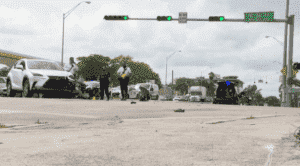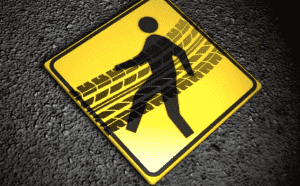
If you were hurt or your vehicle was damaged in a rideshare crash, you likely have immediate questions about filing a claim, which insurance applies, and how to protect your rights.
Our Miami car accident lawyer at Anidjar & Levine empathizes with the stress you’re facing, and we are here to explain the steps to take right away, how rideshare companies handle claims in Florida, and when you should consider legal help. Read on to learn more about how to file a claim after a Lyft or Uber crash in Miami.
Immediate Steps to Take After a Rideshare Crash
Your safety and any urgent medical needs come first. If you can do so safely, move out of traffic and call 911 for police and medical responders. Collect basic information at the scene:
- Exchange names, phone numbers, and insurance details with other drivers.
- Note whether the rideshare driver had a passenger or was logged into the app.
- Take photos of vehicles, visible injuries, road conditions, and any traffic signs.
If you cannot gather everything right away, ask a trusted friend or family member to help. Make sure you get a copy of the police report when it’s available.
How Long Do You Have to File a Claim After a Lyft or Uber Crash?
In Florida, the time limit to file a claim after a Lyft or Uber crash is generally two years from the date of the accident. This deadline, known as the statute of limitations, applies to most personal injury cases, including rideshare accidents in Miami.
If you miss this two-year window, you likely lose the chance to pursue compensation for medical bills, lost wages, and pain and suffering. That’s why it’s important to act quickly, even if you’re still recovering.
Starting your claim early also gives your lawyer time to gather key evidence, such as rideshare app data, dashcam footage, and witness statements. This can strengthen your case and improve your chances of a successful outcome.
Reporting the Accident to Lyft, Uber, and Law Enforcement
Report the crash to local police and request a crash report number. This official record often plays a key role in insurance and legal claims.
You should also report the incident to Lyft or Uber through their app or help center as soon as possible. Both companies have online reporting systems and often request details, photos, and the police report number.
Keep copies of every message and confirmation you receive from the rideshare company. These records can matter later when you file a claim. This is one of the most important steps of filing a claim after a Lyft or Uber crash in Miami.
Florida Rideshare Insurance Rules That Affect Your Claim
Florida law and rideshare company policies determine which insurance applies, depending on the driver’s app status and who was at fault.
If the driver was offline and not transporting a passenger, their personal insurance typically applies. If the driver was logged into the app but waiting for a ride request, Lyft and Uber usually provide contingent liability coverage. When the driver has a passenger or is en route to pick one up, the companies typically provide higher liability limits.
Before filing a formal claim, identify the driver’s app status at the time of the crash and obtain any insurance information from the company.
What Damages Can You Recover After a Lyft or Uber Crash in Miami?
If you were injured in a Lyft or Uber crash in Miami, you may be able to recover compensation for different types of damages. These typically include both financial losses and the physical and emotional toll of the accident.
Common damages include medical expenses for emergency treatment, hospital visits, rehabilitation, and future care if your injuries require long-term treatment. Lost wages are also recoverable if your injuries kept you out of work, along with reduced earning capacity if you can’t return to the same job.
You may also recover money for pain and suffering, which covers the physical pain and emotional distress caused by the crash. This category often makes up a large portion of a settlement, as it accounts for how your life has been affected beyond financial losses.
Filing A Claim Against Lyft, Uber, or The Other Driver in Miami
You will need to decide which party to claim against based on fault and available insurance. You may need to file:
- A claim with the at-fault driver’s personal insurer.
- A claim with Lyft’s or Uber’s insurer if the company covered the driver at the time.
- A personal injury protection (PIP) claim is available if you qualify under Florida’s no-fault rules.
When you file, include a clear summary of the crash, photos, police report number, medical records, and bills. Keep copies of all correspondence and claim numbers.
Documenting Injuries for a Miami Lyft or Uber Crash Claim
Strong documentation supports your claim and helps you recover fair compensation. Collect and preserve:
- Medical records, doctor notes, and bills related to the crash.
- Receipts for vehicle repairs, rental cars, or transportation.
- Photos of injuries over time and expert reports, if available.
- A diary of symptoms, medical appointments, and how injuries affect daily life.
Early medical treatment is important both for your health and for a claim. Even if injuries seem minor at first, keep medical records of all visits and treatments. Documenting your injuries can help strengthen your claim after a Lyft or Uber crash in Miami.
Timeline, Settlement Expectations, and Common Issues in Miami Rideshare Cases
Claims can take weeks to months, depending on medical recovery and the difficulty of insurance questions. Common delays include disputes over which insurer is primary and disagreements about the severity of injuries.
Be prepared for:
- Multiple rounds of requests for documentation.
- Settlement offers that may arrive early and be lower than you need.
- Possible litigation if insurers refuse reasonable compensation.
Stay organized and respond to requests promptly to avoid unnecessary delays.
Learn More About Filing a Claim After a Lyft or Uber Crash in Miami
If you have questions about a rideshare crash claim, keep detailed records and seek advice about your options. We offer a free case review to explain potential paths forward and how a claim might proceed.
Contact us to schedule a review and discuss your claim so we can help you pursue fair compensation.










